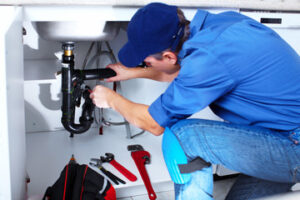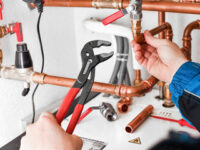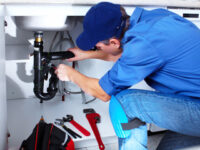What Does it Take to Be a Plumber?
Plumbers install and repair pipes that carry water, gas and sewage. Plumbers also work on plumbing systems in new buildings and houses. They are exposed to microbes excreted in human waste that can cause infections like cholera, typhoid and hepatitis. To become a plumber, you must complete a vocational school program or an apprenticeship. The training usually takes several years and consists of learning on the job under licensed professionals.
 Plumbing is a highly technical trade that requires extensive education and training. Most plumbers have a high school diploma and complete an apprenticeship program that lasts four or five years. Many post-secondary schools offer certificate programs in plumbing, pipefitting and welding. These programs are shorter than the traditional four-year bachelor’s degree programs and cost less. Some states offer scholarships to help offset the cost of plumbing education.
Plumbing is a highly technical trade that requires extensive education and training. Most plumbers have a high school diploma and complete an apprenticeship program that lasts four or five years. Many post-secondary schools offer certificate programs in plumbing, pipefitting and welding. These programs are shorter than the traditional four-year bachelor’s degree programs and cost less. Some states offer scholarships to help offset the cost of plumbing education.
Plumbers must have a strong understanding of physical sciences and math in order to properly repair and install pipes and fixtures. They also need to be able to identify the cause of a problem and provide realistic solutions. In addition, plumbers must be able to work in a fast-paced environment while completing projects. This is because most of their clients are experiencing a crisis and need immediate assistance.
The most important skill to have as a plumber is being able to troubleshoot problems. This can be done by testing and analyzing water flow, pressure and temperature. Plumbers must also be able to read blueprints and determine the best placement of wall passages, fixtures and drains. This will save time and money for both the homeowner and plumber.
Because plumbers often work with hazardous materials, they need to be able to follow strict safety guidelines. These include wearing personal protective equipment, such as gloves and eye protection, when working with chemicals or natural gas. In addition, they must be able to handle tools and heavy machinery.
It is also important for plumbers to stay up-to-date on the latest technology and techniques. This way, they can offer their customers the best service and products. In addition, they should use quality parts that will last a long time. This will ensure that the customer is satisfied with the job and will not have to call back for a repeat visit.
Plumbers must be able to work with a variety of different materials, including copper, PVC, plastic and steel. They must also be able to solder, braze and weld these materials in order to repair and install plumbing systems. Plumbers must also be able to work in cramped spaces and be comfortable with the use of power tools.
Depending on where you live, your state or county may require that you be licensed to work as a plumber. This is because the trade is regulated at the local level. In New York City, for example, the Department of Buildings oversees licensing requirements for plumbers in the Big Apple. Other cities and counties, like Ithaca and Onondaga County, have their own licensing departments. Generally, you’ll need to meet minimum education and experience requirements to get your license. You’ll also need to pass a practical and background investigation test.
Most states require that you first complete a plumbing apprenticeship program under the supervision of a master plumber. The length of this apprenticeship varies by state. In some states, it’s as long as four years. Then you can move on to become a journeyman plumber by logging at least another five years of work experience. Finally, you can take a test and become a master plumber.
In addition to the hands-on aspect of the job, plumbers must have good interpersonal skills to communicate with people who hire them and with those who supervise them. They also must have the ability to solve complex problems in a short time frame, while projects are ongoing. Plumbers must also be able to collaborate with electrical professionals to make sure their systems work together.
One of the biggest risks for plumbers is exposure to infectious diseases while working on sewage systems. This can include diseases like cholera, typhoid, hepatitis and more. To reduce this risk, plumbers should follow health and safety guidelines, wear protective clothing and use a respirator when working with sewage.
Those who own their own plumbing businesses must have a commercial general liability insurance policy to protect themselves and their clients against property damage or bodily injury claims. In addition, they should have a business auto insurance policy to cover the costs of any vehicles used in their plumbing businesses. Those who are covered by unions typically receive additional coverage through their respective trade associations.
Plumbers work both indoors and outdoors, often alone or with a small team of other construction professionals. They are responsible for installing pipes that carry water, gas and other materials to appliances and fixtures such as bathtubs and toilets. Their duties also include repairing and maintaining these fixtures and appliances. Plumbers must be able to identify problems and find solutions in order to keep their jobs running smoothly.
Plumbing work can be extremely physically demanding, with long periods of standing or crouching required. They are also expected to follow layouts, diagrams and blueprints when joining pipes together. This type of work can be dangerous and is prone to injuries such as falls from ladders or cuts from sharp tools. As a result, it is important for plumbers to maintain a high level of physical fitness and avoid excessive smoking or drinking alcohol while on the job.
Typical qualifications for becoming a plumber include a high school diploma or equivalent and completion of a vocational training program or apprenticeship. Some colleges and technical institutes offer courses in plumbing while others can be found through local trade unions. An apprenticeship typically lasts up to five years and involves both classroom learning and on the job training. Those looking to become plumbers should make sure they understand local codes and regulations before applying for an apprenticeship.
The demand for qualified plumbers is high, but it is also a highly competitive field. Candidates should be ready to work hard and learn from more experienced plumbers in order to stand out from the crowd. They should also be prepared to travel in order to meet the needs of clients. Finally, it is important for plumbers to have excellent verbal communication skills in order to explain their services to customers. This is a critical skill in this career, as it allows them to build strong relationships with their customers, which in turn can lead to future business opportunities.
In general, plumbers tend to be paid better in states where there is a higher demand for their services. This is because companies are willing to pay more for workers that are in high demand, which in turn raises the salary. Additionally, the cost of living in a certain area will also affect the salary that plumbers can expect to receive.
Another factor that can affect the salary of a plumber is their experience level. The more experienced a plumber is, the more they will be able to command in terms of salary. This is because employers will be willing to invest more money in training someone who has extensive knowledge and expertise in the field.
Plumbing is a highly skilled profession that offers excellent career prospects for those with the right skills and training. There are several ways to get started in this trade, including getting an apprenticeship or taking a college course. Once you’re qualified, you can start working as a plumber or work towards becoming a master plumber. Master plumbers are the most in-demand, and they typically specialize in a particular aspect of the industry such as sanitation or air conditioning.
Many plumbers work for construction or service companies. Others may choose to go into the private sector where they can set their own hours and work for themselves. In either case, there are plenty of opportunities for plumbers to find jobs that suit their needs and lifestyle.
A plumber’s job is to install pipes that carry water or other liquids, as well as toilets and bathtubs. They must be able to troubleshoot problems and come up with solutions quickly and efficiently. In addition, they may need to perform repairs on gas or steam heating systems.
Plumbers also need to have good verbal communication skills so they can explain the work that is needed and what it will entail. Lastly, they need to be physically strong enough to handle the heavy tools and equipment that are used in the job.
Some plumbers earn bonuses in addition to their regular wages. These may be tied to specific goals that the company has set for itself, such as increasing sales or customer satisfaction. Alternatively, they may be based on the performance of individual plumbers.






